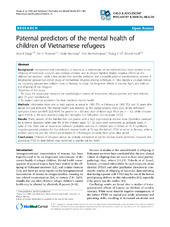| dc.contributor.author | Vaage, Aina Basilier | eng |
| dc.contributor.author | Thomsen, Per Hove | eng |
| dc.contributor.author | Rousseau, Cécile | eng |
| dc.contributor.author | Wentzel-Larsen, Tore | eng |
| dc.contributor.author | V Ta, Tong | eng |
| dc.contributor.author | Hauff, Edvard | eng |
| dc.date.accessioned | 2012-02-07T10:57:44Z | |
| dc.date.accessioned | 2020-12-10T06:27:15Z | |
| dc.date.available | 2012-02-07T10:57:44Z | |
| dc.date.available | 2020-12-10T06:27:15Z | |
| dc.date.issued | 2011-01-10 | eng |
| dc.identifier.citation | Child and Adolescent Psychiatry and Mental Health 2011, 5:2 | en |
| dc.identifier.issn | 1753-2000 | |
| dc.identifier.uri | https://hdl.handle.net/1956/5562 | |
| dc.description.abstract | Background: Intergenerational transmission of trauma as a determinant of mental health has been studied in the offspring of Holocaust survivors and combat veterans, and in refugee families. Mainly negative effects on the children are reported, while a few studies also describe resilience and a possible positive transformation process. A longitudinal prospective cohort study of Vietnamese refugees arriving in Norway in 1982 reports a 23 years followup, including spouses and children born in Norway, to study the long-term effects of trauma, flight, and exile on the offspring of the refugees. Objectives of the study: 1. To study the association between the psychological distress of Vietnamese refugee parents and their children after 23 years resettlement. 2. To analyse paternal predictors for their children’s mental health. Methods: Information from one or both parents at arrival in 1982 (T1), at follow-up in 1985 (T2), and 23 years after arrival (T3) was included. The mental health was assessed by the Global Severity Index (GSI) of the self-report Symptom Check List-90-R (SCL-90-R) for parents (n = 88) and older children (age 19-23 yrs, n = 12), while children aged 4-18 (n = 94) were assessed using the Strengths and Difficulties Questionnaire (SDQ). Results: Thirty percent of the families had one parent with a high psychological distress score ("probable caseness” for a mental disorder), while only 4% of the children aged 10 - 23 years were considered as probable cases. In spite of this, there was an association between probable caseness in children and in fathers at T3. A significant negative paternal predictor for the children’s mental health at T3 was the father’s PTSD at arrival in Norway, while a positive predictor was the father’s participation in a Norwegian network three years after arrival. Conclusions: Children of refugees cannot be globally considered at risk for mental health problems. However, the preceding PTSD in their fathers may constitute a specific risk for them. | en_US |
| dc.language.iso | eng | eng |
| dc.publisher | BioMed Central | eng |
| dc.rights | Attribution 2.0 Generic (CC BY 2.0) | eng |
| dc.rights.uri | http://creativecommons.org/licenses/by/2.0/ | eng |
| dc.title | Paternal predictors of the mental health of children of Vietnamese refugees | eng |
| dc.type | Peer reviewed | eng |
| dc.type | Journal article | eng |
| dc.rights.holder | Copyright 2011 Vaage et al; licensee BioMed Central Ltd. | |
| dc.description.version | publishedVersion | |
| dc.identifier.doi | https://doi.org/10.1186/1753-2000-5-2 | |
| dc.identifier.cristin | 890067 | |
| dc.subject.nsi | VDP::Medical disciplines: 700::Clinical medical disciplines: 750::Psychiatry, child psychiatry: 757 | eng |

